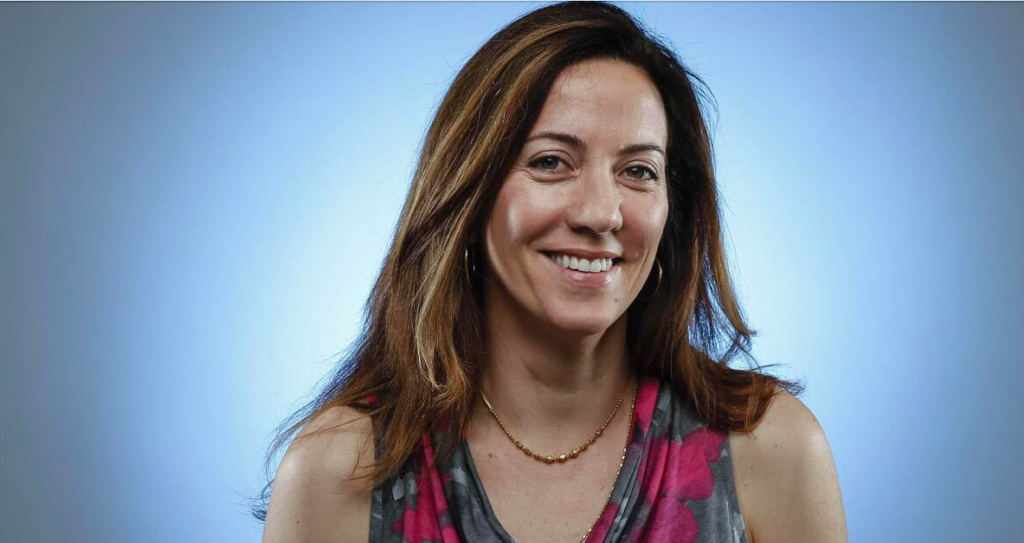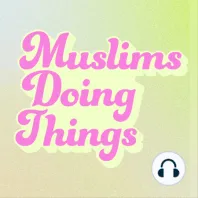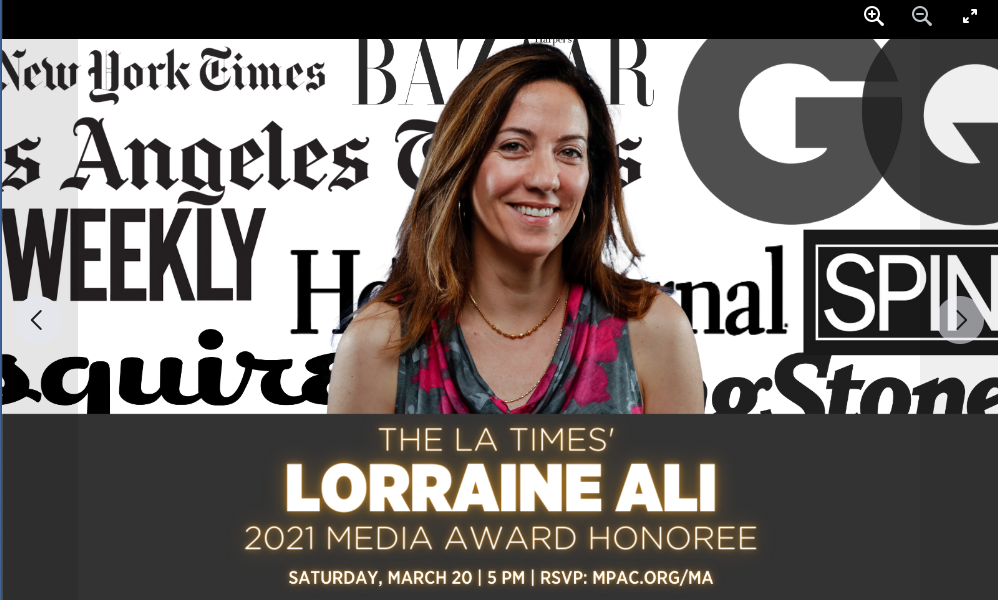Pathbreakers of Arab America: Lorraine Ali

By: John Mason / Arab America Contributing Writer
This is the sixteenth in Arab America’s series on American pathbreakers of Arab descent. The series includes personalities from entertainment, business, sports, science, academia, journalism, and politics, among other areas. Arab America contributing writer, John Mason, highlights our sixteenth pathbreaker, Lorraine Ali, born in Los Angeles, California. Her father was a Muslim immigrant from Baghdad, Iraq, and her mother, was a native Californian of French-Canadian ancestry. She is a celebrated journalist and music critic who has written for the most prestigious publications. Ali is presently a TV critic for the Los Angeles Times. She has written proudly in defense of her Muslim religion.
Celebrated journalist and TV critic, Ali has written for many prestigious publications
Lorraine Ali’s father is an important part of her Arab American story. He immigrated in 1953 from Baghdad to California, where he met and married her mother. She refers to her mother in a Newsweek piece as “a blue-eyed California girl. I’ve always been proud of my father for taking a chance, leaving all he knew to ‘make it big’ by starting his own rental car business.”
To Ali’s warm-hearted story of her parents, she added, “I’ve also admired my mother’s courage in dating and marrying a man so different from her own French Canadian, conservative father and Protestant, American mother. But they were somehow meant to be. It seemed too unlikely that the two would meet randomly at a polka dance in downtown Los Angeles if it wasn’t willed by God, fate, Allah.”
From that marriage, emerged a very talented Arab American journalist, who has created a distinguished record as a journalist and music and TV critic. Ali began her career in the 1990s writing about local Los Angeles music artists for the LA Weekly before becoming a regular writer with the Los Angeles Times under the editorship of Robert Hilburn. Ali’s work was included in Da Capo’s “Best Music Writing 2001.”
Prior to Ali’s position at the LA Times, she wrote for numerous well-known publications, including Rolling Stone, Mademoiselle, Esquire, SPIN, The Village Voice, Adweek, Entertainment Weekly, Harper’s Bazaar and Option. She often appears as an expert voice on television for such programs as Oprah, Charlie Rose, CNN, BBC among others. She has been unafraid to discuss such problems as the U.S. role in Iraq and American-Muslim issues.

Ali, an outspoken defender of Arabs, her Iraqi Arab family, and her Muslim faith
Ali’s connections to her extended Iraqi family have been tight and emotional. She personally witnessed from a distance part of her extended family’s flight from Baghdad in 2003. Her uncle’s family, according to the same Newsweek article, “have been holed up for months in that house as battles rage in and around their Mansour neighborhood. I can hear the anarchy outside their door when I call—explosions, gunshots and, once, a scream. Still, my 77-year-old diabetic uncle greets me like the world is full of roses: “Habibi hiyati! [Love of my life!] How is my American girl?”
Ali wrote of how her cousins who made it out of Iraq with hundreds of thousands of others were then “part of the fastest-growing refugee crisis in the world. An estimated 2.3 million Iraqis have fled the country since the 2003 invasion. They represent the largest displacement of people in the region since the Palestinian diaspora nearly a half-century ago.” She also noted at that time, 2003 onward, that the U.S. had only taken in 466 Iraqi refugees.
While Ali is proud of her Arab American-ness, she is reticent about it, as well. She wrote, in yet another Newsweek article, “Sometimes I feel like part of a new experiment. I am an Arab-American, one of an estimated 2 million who are slowly becoming a recognized political and social force in the United States. Unlike many, I am not a new immigrant but rather the American-born daughter of an Iraqi father and an American mother. In less cocky moments, I jokingly refer to myself as a fake Arab, one who knows little about my Middle Eastern heritage, or a half-American who’s still oblivious to some basic U.S. customs.”
A wonderful passage by Ali on being caught between the cultures of her mother’s and father’s cultures is: “My two older sisters and I grew up between their worlds–Arab and American, Muslim and Christian. We went to the mosque and Sunday school. We listened to rock on the radio and the Quran suras my father would pop in the cassette player on the drive to work. In my lunchbox, I carried dolma and Syrian bread one day, and peanut butter and jelly the next. On the dolma days, the other kids looked at my meal as though it was shot down from outer space. Little did they know that some 15 years later, pita bread and all types of Middle Eastern food would become part of the American diet, served in malls and beachside boardwalks.”
Not so amusing is Ali’s feelings about how Arabs and Muslims have been portrayed in movies and on TV “as bloodthirsty savages, terrorists, dishonest and hygienically challenged. Even in Ali’s own schoolyard hostility would emerge, with such questions to her and her sisters as, “Uh-oh, are you packing a bomb?” or “Cool, where is your family from?” She liked the second question, allowing her to tell the other kids about how much more to life there was in Iraq than what the nightly TV showed. Ali had been to Iraq and she was proud of her family and their Middle Eastern background.

In defense of Arabs and Muslims—Ali faces critics’ vindictive attacks
Ali, in her book critic role, had taken on Somali Ayaan Hirsi’s 2007 book, Infidel, which savaged the Muslim faith. To defend Islam, some troublemakers took on Ali in a highly personal way. Insults to her are hard to read, they are so insulting. Following 9/11, there was a significant backlash against Islam, which Ali wrote about openly and frankly.
In critiquing the Netflix series, Caliphate, Ali wrote in the LA Times, “Using techniques familiar from scripted television — it isn’t merely damaging to Muslims, who’ve been tarred with the same broad brush since the 9/11 attacks. It also renders suspect the critical contributions of the many journalists, often at great risk to themselves, who have produced irreproachable reporting about the ways ISIS and other violent organizations have reshaped our world.”
There is every good reason, given her stature and her integrity, that Ali takes on the Arab and Islam haters in her profession. How could she not? Given her proud family background and her fine journalistic instincts, she has every right to counter hatred and to educate significant numbers of Americans in the values of Arab culture and Islam.
Sources:
— “Lorraine Ali,” Wikipedia List of Arab Americans, 2023
–“Forced To Flee Iraq,” Lorraine Ali, Newsweek, 3/18/2007
–“An Arab In America,” Lorraine Ali, in Newsweek, 5/13/2001
–“Meet Lorraine Ali, Mendacious Muslim ‘Media Critic’,” PJ Media, 9/28/17
–“Commentary: ‘Caliphate’ let listeners hear what they wanted to hear about Muslims. And fear sells,” Los Angeles Times, 10/14/2020
John Mason, PhD., who focuses on Arab culture, society, and history, is the author of LEFT-HANDED IN AN ISLAMIC WORLD: An Anthropologist’s Journey into the Middle East, New Academia Publishing, 2017. He has taught at the University of Libya, Benghazi, Rennselaer Polytechnic Institute in New York, and the American University in Cairo; John served with the United Nations in Tripoli, Libya, and consulted extensively on socioeconomic and political development for USAID and the World Bank in 65 countries.
The views and opinions expressed in this article are those of the author and do not necessarily reflect the position of Arab America.
Check out our Blog here!








